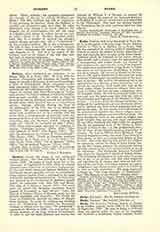

Burigny, JEAN LEVESQUE DE, historian, b. at Reims, 1692; d. at Paris, 1785. In 1713, with his brothers, Champeaux and Levesque de Pouilly, he began to compile a dictionary of universal knowledge, a kind of encyclopaedia, which comprised twelve large manuscript folios, and afforded Burigny ample material for his subsequent works. In 1718, at The Hague, he worked with Saint-Hyacinthe on “L’Europe savante”, in twelve volumes, of which he contributed at least one-half. On his return to Paris, he devoted his time to historical research and published several works which stamped him as a conscientious scholar. Burigny, although sharing the ideas of the philosophers of his time, was by no means an extremist. He was a modest, peace-loving man, whose only ambition was to be a scholar, and his works show a great amount of learning; some, for instance his lives of Grotius and Erasmus, give very interesting data not elsewhere found. Among his works are: “Traite de l’autorite du pape” (Paris, 1782) which reduces papal authority to a primacy of honor, “Theologie palenne” (Paris, 1754); “Histoire generale de Sicile” (The Hague, 1745); “Histoire des revolutions de l’empire de Constantinople” (The Hague, 1750); “Traite de Porphyre touchant l’abstinence de la chair, avec la vie de Plotin” (tr. from Greek; Paris, 1740); “Vie de Bossuet” (Paris, 1761); “Vie du cardinal Duperron” (Paris, 1768).
PIERRE J. MARIQUE

